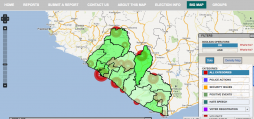governance
Posted by AnneryanHeatwole on Dec 03, 2011
On November 8, 2011, the Liberian President Ellen Johnson Sirleaf won her re-election campaign following a contentious runoff vote. In the October 11 general election, neither of the top two presidential candidates secured a majority vote –Johnson Sirleaf received 43.9% of votes and opposition candidate Winston Tubman received 32.7% of the nation’s votes. Johnson Sirleaf and Tubman were scheduled to participate in a November 8 runoff election; however, Tubman boycotted it saying that the first elections had been unfair; a claim international election observers dispute. As the only candidate, Sirleaf won the runoff despite a low 37.4% of eligible voters coming out for the second round (compared to more than 70% for the first round).
In light of the election’s tumult, MobileActive.org spoke to the National Democratic Institute and Ushahidi Liberia to learn more about their respective work in the country encouraging transparency and fairness through election monitoring and citizen reporting.
The National Democratic Institute and Ushahidi in the 2011 Liberian Elections
Elections can be rigged in many ways, and voter fraud is varied. For instance, ballots can be changed or manipulated, voters can be influenced through intimidation or bribes, violence can shut down polling stations, or ballots can be changed after the election before the results are announced. Technical difficulties can also influence an election by preventing voters from casting their votes or having those votes accurately counted; difficulties could include long lines, failure to open a polling place on time, or a lack of necessary supplies.
| Technology in the 2011 Liberian Elections: Mobiles, Monitoring, and Mapping data sheet 1787 Views |
| Countries: |
Liberia
|
Posted by MarkWeingarten on Feb 19, 2011
Mobile Governance: Empowering Citizens to Enhance Democratic Processes data sheet 1906 Views
Abstract:
This paper offers an overview of the emerging domain of mobile governance as an offspring of the broader landscape of e-governance. Mobile governance initiatives have been deployed everywhere in parallel to the development of crowdsourced, open source software applications that facilitate the collection, aggregation, and dissemination of both information and data coming from different sources: citizens, organizations, public bodies, etc. Ultimately, mobile governance can be seen as a tool to promote the rule of law from a decentralized, distributed, and bottom-up perspective.
Posted by MohiniBhavsar on Sep 14, 2010
The MHIF System Supporting the Health Impact Fund with Mobile Technology data sheet 554 Views
Author:
Juggs Ravalia and Lennart Stern
Abstract:
The Health Impact Fund (HIF) is a proposal designed to incentivize pharmaceutical innovation by rewarding the development of new medicines in proportion to their health impact. The health care sector is plagued by wastage and poor governance, especially in developing countries. The MHIF system is a mobile payment and data collection system designed to enhance transparency and accountability, whilst improving the quality of data available for impact assessment. It also provides a platform for reporting misuse and abuse. The system is designed to mitigate some of the deployment challenges of the HIF and to act as a springboard for further expansion into broader mobile health (MHealth) solutions.
Posted by AnneryanHeatwole on Jul 16, 2010
The Mobile Minute, our new feature, is here to keep you up-to-date on mobile-related news. Today's stories are about the number of Google searches made on mobile phones, an updated version of the PDA survey kit, the relationship between ICTs and accountable governments, and an octopus-themed mobile app.
- "Mobile Accounts for 10% of Google Searches, Says Analyst" This Read, Write, Web article looks at comScore search market data – and found that mobile phones are used to make more than 1 billion monthly Google searches in the U.S.
- "WFP PDASurvey" The World Food Program released an updated version of its PDA-based data collection tool. The group says that the program "allows very large questionnaires to be built very rapidly and deployed onto many PDAs using flash memory cards."
- "Full Circle: ANSA-Africa Newsletter" The latest ANSA-Africa Newsletter looks at government accountability and the role ICTs can play in giving citizens a means of expression. Other topics include local government social media and responsibility, ICTs in Kenya, and creating connections in Bangladesh. (via Accountability 2.0)
- "Paul the Psychic Octopus Gets an App" If you find yourself without psychic guidance now that Paul the Octopus (who gained fame by correctly predicting all of Germany's World Cup matches, as well as the final) has retired, a new iPhone app called "Ask the Octopus Oracle" can fill the void.
[Mobile Minute Disclaimer: The Mobile Minute is a quick round-up of interesting stories that have come across our RSS and Twitter feeds to keep you informed of the rapid pace of innovation. Read them and enjoy them, but know that we have not deeply investigated these news items. For more in-depth information about the ever-growing field of mobile tech for social change, check out our blog-posts, white papers and research, how-tos, and case studies.]
Image courtesy Flickr user QiFei

